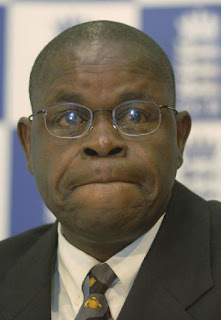
Peter Chingoka has always denied links to the Mugabe regime...
The UK government has asked the ICC for a copy of the independent forensic audit into the financial affairs of Zimbabwe Cricket before it will consider granting ZC chairman Peter Chingoka a visa to enter the UK for June's ICC annual conference.
Chingoka was only granted a limited-entry visa to the UK for last year's meeting and was subsequently denied entry in October when he was due to give evidence in the tribunal investigating Darrell Hair's unfair dismissal claim against the ICC.
Cricinfo learned that the recommendation to block Chingoka came from the UK embassy in Harare, which cited close links between him and the ruling Zanu-PF regime. It was subsequently revealed that he would have been barred from entering the UK last June were it not for the intervention of Richard Caborn, the then minister for media, culture and sports, who stepped in as it was felt such a move would have compromised David Morgan's bid to become the next ICC president.
Andy Burnham, Caborn's successor, has been more bullish in his comments, reflecting a hardening of the government policy towards Zimbabwe under Gordon Brown. The fear within the ECB is that if Chingoka is refused entry the ICC will move the annual meeting away from London. The issue is a likely preliminary skirmish in the much bigger battle of whether Zimbabwe will be allowed to tour England in May and June 2009.
There have been serious concerns over the finances of Zimbabwe Cricket for several years and in June 2007 the ICC demanded an independent forensic audit be undertaken by KPMG. At the time ICC chief executive Malcolm Speed said in a confidential but leaked memo that the auditors and ICC had been "misled" about some transactions, concluding: "It is clear that the accounts of ZC have been deliberately falsified to mask various illegal transactions from the auditors and the government of Zimbabwe."
Cricinfo has learned that ZC will defend its conduct with an explanation that the financial situation inside Zimbabwe, allied to stringent foreign exchange regulations, means that irregular behaviour is not only necessary to enable it to operate but is also normal inside the country. Given that Chingoka has influential allies among other chief executives, it is not believed that any major action will be taken.
The UK government will face tough questions if it does decide to allow Chingoka in, not least from Kate Hoey, the chair of the all-party parliamentary group on Zimbabwe, who has described him as a "political commissar" installed by Robert Mugabe, adding that "Zimbabwe's cricket officials are at the heart of the dictatorship's web of corruption and political oppression".
Given that he was not refused a visa last year because of the financial investigation into ZC's finances, critics of Zimbabwe will ask what has changed to make it acceptable for Chingoka to be allowed into the country at the same time the overall government line is hardening.
A source at Westminster suggested that the government's thinking was that if they got hold of the KPMG audit "it would be more difficult for the ICC to sweep it under the carpet ... they seem confident it will damn Chingoka and therefore vindicate the tough line they have adopted".
Saturday, March 15, 2008
Chingoka entry into UK in the balance
Posted by
Faizan Rasool
at
2:22 PM
![]()
![]()




